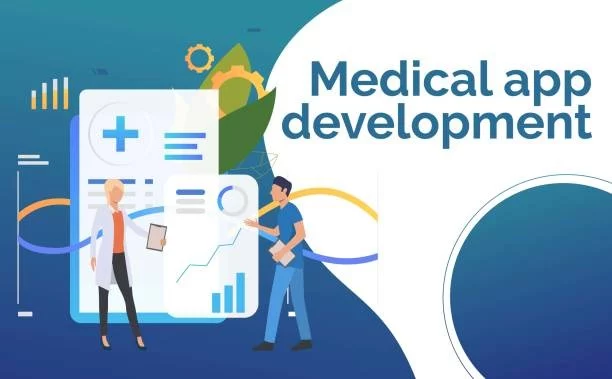Custom software development is a systematic approach that helps businesses develop tailored solutions to fulfill their unique needs. With custom solutions, companies can get the features of their choice in addition to enhanced scalability, which means these solutions are scalable to meet the needs of the companies.
If you want to build custom software to gain a significant advantage over your competitors, let us tell you all about these solutions. So that you don’t rely on generic or off-the-shelf products like your competitors, we are starting with a brief introduction to custom healthcare solution development.
What is Custom Healthcare Software Development?
Developing custom healthcare software is about solving unique challenges by building custom healthcare solutions. These are scalable, which means they evolve with the company’s growth, and there are different types of healthcare solutions, such as telemedicine and billing systems.
Customized software is best for hospitals with a large influx of patients in different locations because off-the-shelf software, due to its limited flexibility, can crash or might need an upgrade to gain access to advanced features.
Types of Custom Healthcare Software
There are different types of healthcare software serving the patients and the doctors alike:
- Electronic Health Records (EHR)
- Telemedicine Solutions
- Patient Portals
- E-Prescribing Software
- Medical Billing Software
- Medical Imaging Software
- Mobile Health Applications (mHealth)
You might have seen many solutions in the market, and the thought of buying and using them may have crossed your mind.
However, using off-the-shelf software instead of customized software is not always the best choice. This is a considerable debate, and let us tell you the main difference between custom and off-the-shelf solutions.
Off-the-shelf vs Custom Healthcare Software
Custom healthcare software vs Off-the-shelf software is a continuing debate!
- The custom software is designed for a specific customer or an organization to meet their unique needs, whereas off-the-shelf software is more generalized. For example, a hospital needs software to streamline its billing process, keeping billing and security issues in mind. This differs from off-the-shelf software, which is not personalized or tailored.
- Off-the-shelf software doesn’t hold much room for customization, whereas custom software is designed with the client’s needs kept in view.
- Custom software contains features and functionalities that a client may require. However, users might have to pay for advanced features in off-the-shelf software.
- Custom healthcare software offers tailored features that easily fit specific clinical workflows and patient care goals. This increases efficiency, enhances data accuracy, and ensures compliance with HIPAA and HL7, in contrast to off-the-shelf options that adapt seamlessly with varying practices in healthcare.
In short, there is no right choice in custom vs offshore software; it all boils down to user needs. Below are the advantages of custom solutions that will further strengthen your decision to invest in them.
Top Reasons to Invest in Custom Healthcare Software in 2025
Custom healthcare software development supports data management, regulatory compliance, and workflow optimization. This approach ensures scalability, flexibility, and easy integration with existing systems. The benefits given below will convince you to invest in custom software.
- Improved Operational Efficiencies
Tailored healthcare software enhances efficiency by automating routine tasks and minimizing manual errors. This software integrates seamlessly with existing systems, allowing faster access to patient data, which supports real-time decision-making. Also, the customized features ensure that the staff spends less time on administrative tasks and more on patient care. This leads to reduced costs and enhanced overall healthcare delivery.
The custom solutions help healthcare organizations identify areas of improvement and build systems for optimizing performance using a data-driven approach.
- Meeting the Unique Needs of Healthcare
The healthcare industry has challenges and needs that vary across departments, institutions, and patient demographics. The custom software offers solutions tailored to a hospital or clinic’s needs.
For instance, a specialized clinic might need a solution different from a hospital or research organization. Or a healthcare institution might require both the features of a clinic and a hospital software. Here, the off-the-shelf healthcare software fails to meet the diverse needs or flexibility requirements.
In addition to meeting unique challenges, custom software contributes to daily operations by improving efficiency.
- Addressing Gaps
Off-the-shelf solutions are designed and developed for larger audiences and often lack flexibility in their offerings. They are made to provide low-level customization.
Here, the custom solutions fill the gap by offering features that support personalization and an organization’s unique needs. Whether integrating telehealth features or improving patient data analytics. The custom solutions ensure that everything is done smoothly.
- Efficiency in Healthcare Management
The healthcare institution needs efficient management of tasks like treating patients, resource allocation, financial operations, staff scheduling, and compliance with healthcare standards. Custom healthcare software automates these tasks by streamlining workflows and ensuring clinical information is always available. This reduces administrative burden, improves decision-making, and provides an efficient patient care experience.
- Flexibility
The custom solution can enhance scalability and flexibility to fulfill the unique needs of businesses and secure their future growth plans. These are designed with modular architecture, allowing easy expansion with changes in needs. With the increase in user demands, the custom software grows efficiently through transactions or other third-party operations.
Businesses can prioritize essential features for their workflow, avoiding unnecessary tools that increase the cost.
- Respond to Market Changes
The tailored custom health solutions allow organizations to adapt to transforming market demands and patient expectations. On the other hand, the off-the-shelf software cannot be modified to meet the new needs. This flexibility allows healthcare institutions to stay competitive and improve patient health by aligning with industry trends.
- Data Security & Privacy
Custom software ensures data security by allowing hospitals to implement security measures tailored to meet their needs. They can include advanced encryption, compliance features to meet requirements (compliance with HIPAA and GDPR), and role-based access controls. These features are vital in minimizing exposure to common security threats that can be present on widely used platforms. These solutions also provide flexibility to change or adjust security protocols with the evolution of threats. Additionally, the businesses can control where and how data is stored and accessed.
- Seamless Integration
Another advantage of custom healthcare software development is that it can integrate easily with the existing systems, tools, and databases. This integration eliminates data silos and allows smooth flow of information across various departments supporting interoperability. It can help doctors make efficient decisions to improve their overall performance. Also, presenting a comprehensive view of business operations that can help detect the need for upgrades or inclusion of new technologies, ensuring the system is aligned with the changing business needs.
- Improve Customer Experiences
The custom software allows businesses to develop personalized user experiences. This customization helps improve customer satisfaction, leading to business growth.
Aligning software design and working with user expectations helps organizations create more engaging, intuitive, and personalized interactions. This advanced level customization creates long-term loyalty and builds brand trust. Over time, these factors contribute to increased customer retention and sustainable business growth.
Conclusion
In a nutshell, the custom healthcare software offers powerful customized features that help hospitals meet the unique needs of healthcare institutions. In addition to swiftly adapting to market changes and providing personalized user experiences. Unlike off-the-shelf software, which offers less flexibility and adaptability. All in all, customized software is best for helping healthcare institutions meet their long-term goals.

Lexy Summer is a talented writer with a deep passion for the art of language and storytelling. With a background in editing and content creation, Lexy has honed her skills in crafting clear, engaging, and grammatically flawless writing.



